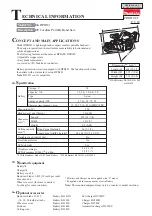
when the Handle is lowered. Never
interfere with the proper movement of
the Blade Guard.
There are locking mechanisms for the
2.
miter angle and the Slides. Unlock
the Table to set the miter angle, then
re-lock it before making the cut.
To rotate the Table, loosen the Miter
3.
Knob (93), rotate the Table to the
desired angle, then tighten the Miter
Knob. Notches are machined into the
Base of the tool which will click the
Table into 5° increments.
To make a bevel cut, loosen the
4.
Bevel Knob (71), rotate the blade
assembly to the desired bevel angle,
then tighten the Bevel Knob to lock
the assembly in place. Making bevel
cuts is discussed in more detail later
in this manual.
This saw is provided with a Kerf
5.
Board. The Kerf Board helps to
prevent tear-out on the bottom side
of the work material. The Kerf Board
is factory adjusted prior to shipment
of this tool so the blade does not
contact the Kerf Board during normal
operation, including bevel cuts.
Adjustment of the Kerf Board and
techniques to prevent tear-out are
discussed later in this booklet.
Before starting work, check the
6.
accuracy of the Guide Fence, miter
angle and bevel angle. Instructions
for checking and adjusting these
angles are discussed later in this
booklet.
It is very important that the work
7.
material be properly supported before
making a cut. The material must be
level on the Table. The material must
be supported on both ends. Using the
Work Piece Extension Supports is
discussed in the next section.
using the work piece
extension Supports
The Work Piece Extension Supports
1.
are inserted into each side of the
Table, and locked in place using the
Wing Screws.
When properly installed, the upper
2.
face of the Work Piece Extension
Supports are level with the Table, and
provide a wider support surface for
the work piece.
Always support the work piece to be
3.
level with the table, and so that after
the cut is made the cut off pieces
will not fall. You may need to use
saw horses or other supports (not
included) to support the work piece.
If the work piece is not level, you will
4.
make an unintentional bevel cut in
the material. If the work piece is not
supported, it will bind the blade and
may cause the material to kick back,
potentially causing injury.
adjusting the miter angle
A miter cut is one that is at an angle
1.
across the horizontal surface of the
material. You will commonly make
45º miter cuts to join two pieces in a
right angle corner. A 30º cut is often
used for a scarf joint or to make a
chamfered end.
To make a miter cut, loosen the Miter
2.
Knob (93) by turning it approximately
1/4 turn counterclockwise. Press
down the Miter Lock Lever to unlock
Page 11
For technical questions, please call 1-800-444-3353.
SKU 67411








































